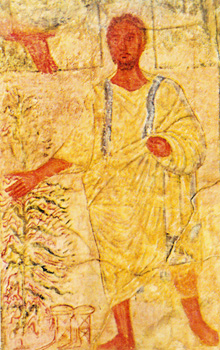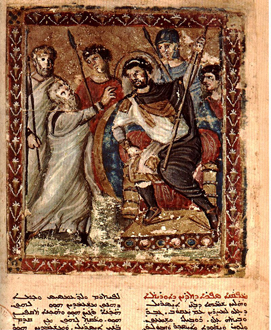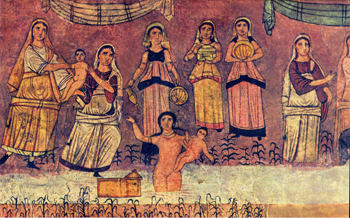For Sunday September 3, 2017
Lectionary Readings (Revised Common Lectionary, Year A)
Exodus 3:1–15 or Jeremiah 15:15–21
Psalm 105:1–6, 23–26, 45c or Psalm 26:1–8
Romans 12:9–21
Matthew 16:21–28
Last month my wife and I attended a Jewish wedding of dear friends in our neighborhood. Two times during the service, the rabbi noted that the ceremony was "according to the tradition of Moses." Her remark reminded me, as Avivah Zornberg puts it in her biography Moses (Yale, 2016), that "no figure looms larger in Jewish culture than Moses, and few have stories that are more enigmatic or compelling." Moses speaks today, 3300 years after he lived.
The story of Moses unfolds during the Egyptian genocide. We read that "all the Egyptians" were ordered to throw "every Hebrew boy" into the Nile River (1:22). The trauma of four centuries of exile — slave labor, ruthless oppression, and economic exploitation — was ending in catastrophe.
More than a thousand years later, in that most Hebraic of gospels, Matthew drew a literary parallel between the old Moses and the New Moses. Whereas the pagan magi of Persia worshipped the baby Jesus, Herod of Rome tried to kill him and all the male babies of Bethlehem. The church came to honor the "slaughter of the innocents" as the first martyrs.
And so the infant Son of God fled as a displaced refugee to a foreign country, Egypt, Israel's sworn and symbolic enemy that had oppressed the Hebrews for 430 years. The place where pharaoh unleashed his infanticide against the firstborn Israelite boys became a refuge for the baby Jesus.
 |
|
Moses and the Burning Bush, Dura Europas Synagogue, c. 250.
|
The baby Moses survived the Egyptian infanticide, and his own faults and fears, because of the courage and compassion of seven women who are specifically mentioned in his birth narrative.
The mid-wives Shiphrah and Puah were two ordinary women who performed extraordinary acts of faith. They defied the Egyptian genocide. Why? Because “they feared God” rather than pharaoh (1:17).
When asked about their disobedience, they lied about what they were doing. It's been suggested that their No to pharaoh and Yes to God "may be the first known incident of civil disobedience in history" (Klagsbrun) — a thousand years before Antigone defied the royal decree of Creon in order to honor her deceased brother. And then, just like that, these two women disappear from the biblical narrative, never to be mentioned again.
Moses's biological mother also resisted the genocide when she "hid him for three months." Then, "when she could hide him no longer," she made a basket of papyrus, put her baby inside it, then floated it onto the Nile River. She saved Moses by simultaneously disobeying and obeying pharaoh's command to throw every male Hebrew baby into the river.
Then, there's Moses's adoptive mother who discovered the floating basket — she's the daughter of pharaoh and an Egyptian princess. She was accompanied by her women "attendants" who helped her to bathe in the river, and a "slave girl" who retrieved the baby Moses from the Nile.
 |
|
Moses before Pharaoh, 6th-century Syriac Bible.
|
Partly out of pity for the crying baby, and surely out of fear of knowing pharaoh's command, the slave girl blurted out that "this is one of the Hebrew babies!" What should be done with him? Her discovery could have meant death, but it turned out to be life.
Miriam, the sister of Moses, "stood at a distance to see what would happen to him." She must have been no more than a young girl herself. She inserted herself into the story quite cleverly by suggesting to the princess that she obtain a Hebrew woman to nurse the crying baby. Shouldn't human pity for a crying baby take precedence over a heartless decree? She proceeded to get her own biological mother, the mother of Moses, who became his nurse.
"When the child grew older," Moses's mother returned him to pharaoh's daughter. He would grow up with an ambiguous triple identity. Moses was a Hebrew born into "the house of Levi" (2:1), he was raised by his adoptive mother as a prince at the center of Egyptian political power (2:10), and then as an adult he married Zipporah of Midian (2:21), the land where he fled into exile for forty years.
After the king of Egypt died during Moses's long exile in Midian, the writer emphasizes the suffering of the Hebrews with four synonyms — they groaned, cried out, screamed, and moaned. And, in a parallel fashion, God responded in a fourfold way — he heard, he remembered, he saw, and took notice (2:23-25).
In the "far side of the desert" at Mt. Horeb, God called Moses to return to Egypt, the land of Israel's genocide, to mediate between God and his people, and between God and pharaoh. He appeared to Moses "in flames of fire from within a bush."
 |
|
Shiphrah, Puah, Jocheved, Miriam, Pharoah's Daughter, and the infant Moses, Dura Europas Synagogue, c. 250.
|
His call was an impossible burden, fraught with ambiguities. When God called him, Moses responded: "Here am I!" But later he wondered, "Who am I?" God assured him that "the people will listen." But Moses worried, "they won't listen" (3:18, 4:1).
So, he was full of ambivalence, inhibitions, fears, and doubts, and rightly so. As Zornberg puts it, "there's a certain kind of reticence, or circumspection, that halts the true prophet, faced with the inscrutable God, whose revelation must be narrowed into what can be said."
No one in their right mind would think themselves worthy or capable of that call — or any call, for that matter. To speak the unspeakable. To name the Unnameable. The presumption. The audacity. The futility. To remove your sandals and stand on "holy ground." And so Moses instinctively "hid his face, because he was afraid to look at God."
Nonetheless, God insisted: "I am sending you to pharaoh to bring my people the Israelites out of Egypt." And when Moses doubted his deepest self, God assured him, "I will be with you" (3:12). In the parallel reading about Jeremiah's own burdensome call, God promised the exact same thing: "Do not be afraid, for I am with you" (Jeremiah 1:8, 15:22).
Such is the paradox and burden of prophecy, observed Martin Buber: "It is laid upon the stammering to bring the voice of Heaven to Earth."
Image credits: (1) Vanderbilt Divinity Library; (2) Wikipedia.org; and (3) Vanderbilt Divinity Library.





